Though spicy cuisine is not synonymous with typical American food staples, it’s wildly popular all across the globe.
From spicy pan-Asian dishes to the hot heat in Latin American foods, people everywhere love the tingling sensation only spices like hot chilies, ginger, and cinnamon can bring.
Personally, I used to be a bit of a wimp when it came to spicy foods. I also used to believe that spicy foods caused tummy issues and lead to ulcers (which is totally wrong).
A friend of mine used to put the hottest habanero sauce on everything and the stuff was so spicy it actually made me tear up. This stuff was from a volcano, I swear.
After making fun of me, I was motivated to start researching and experimenting with different spices to see what I liked. I even learned about some health benefits along the way.
Slowly, but surely, I became a spicy food devotee. Spices make even the healthiest foods seem like a culinary treat.
If you’re just beginning to embrace the heat, let’s learn all about the spice world and discuss why spicy food is so good for you.
What Makes Foods Spicy?
 The heat in hot peppers comes from capsaicinoids, which is the general name for the class of compounds present in the capsicum family of plants.
The heat in hot peppers comes from capsaicinoids, which is the general name for the class of compounds present in the capsicum family of plants.
The most common form of capsicum comes from chili peppers, or the fruits of plants from the capsicum family.
Some of these include:
- Jalapenos
- Habaneros
- Cayenne
- Tabasco
- Thai peppers
- Datil
- Serrano
The most widely studied capsaicinoid is capsaicin. You’ve probably heard of this term in regards to diet pills promising weight loss results.
But you don’t need to snack on habanero peppers, you can choose from a variety of delicious, bold spices such as:
As you can see, there are so many spices to choose from so you can always add a little heat to whatever dish you’re making to amp up the health benefits in your own way.
I add cinnamon, one of my favorite spices, to almost anything I can. Did you know that cinnamon can significantly reduce blood sugar levels and cholesterol in type 2 diabetics?
That’s just one heart-healthy plus spicy foods pack.
Spicy Foods Reduce Cardiovascular Disease
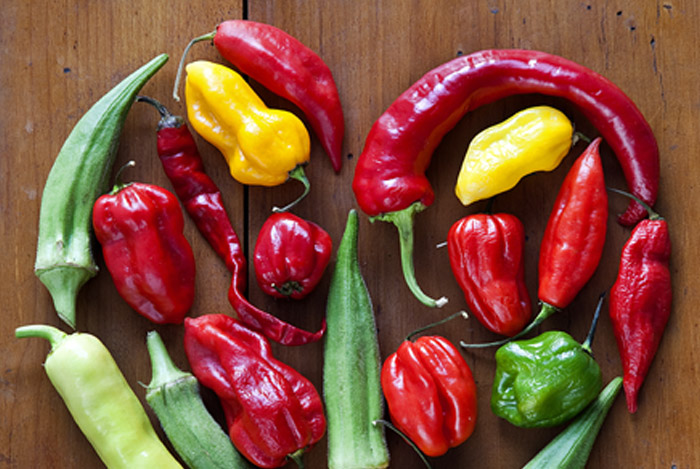 We know the hallmarks of cardiovascular disease; a buildup of plaque in the artery walls that makes it harder for blood to flow throughout our body.
We know the hallmarks of cardiovascular disease; a buildup of plaque in the artery walls that makes it harder for blood to flow throughout our body.
While supporters of the DASH diet don’t necessarily encourage eating spicy foods, they definitely should be.
Capsaicin has been linked to improving the function of our blood vessels. It’s been shown to activate receptors in our body that release nitric oxide. This is super important because nitric oxide helps lower blood pressure by keeping our blood vessels smooth and open, regulating blood flow.
Continued activation of this nitric oxide releasing receptor has been shown to lower blood pressure in hypertensive rats, or rats with high blood pressure. And it can also help lower bad cholesterol levels too.
Scientists in China fed hamsters high cholesterol diets and spiced some of the food with varying levels of capsaicinoids. According to the study, the hamsters fed capsaicinoids had lower LDL, or ‘bad’ cholesterol, levels and even had decreased amounts of plaque in their arteries.
So it seems like a little hot sauce may go a long way towards freeing up those clogged bacon-cheeseburger-loving arteries.
But capsaicin does more than activate cell receptors to lower blood pressure, it can also trigger receptors to lower your risks of developing cancerous tumors.
Spicy Foods Prevent Cancer
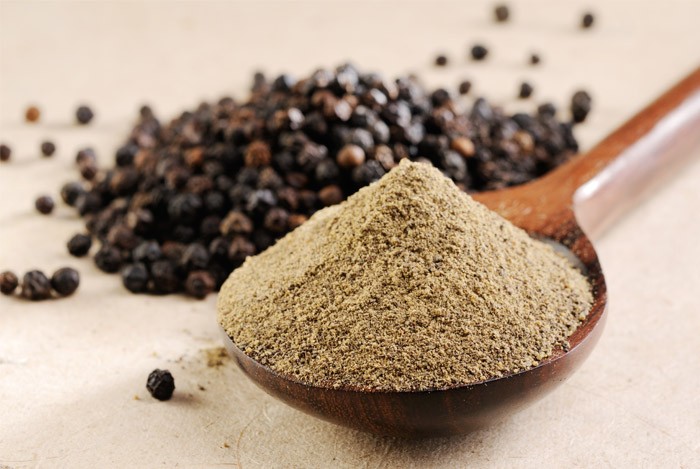 Capsaicin, ginger, and spices like black pepper, have all been known to have powerful antioxidant properties.
Capsaicin, ginger, and spices like black pepper, have all been known to have powerful antioxidant properties.
Unsurprisingly, overall cancer rates are much lower in a spice-loving country like India than countries following typically non-spicy Western diets.
Indians account for some of the highest spice consumption worldwide; they’re fans of using turmeric, curry powders, and peppers in a population that’s 40% vegetarian.
It should come as no shock that Westerners have much higher rates of cancer than Indians. But the rate at which we get cancer in comparison should be cause for alarm.
The fact is, “U.S. men get 23 times more prostate cancer than men in India”, and American women get “5 times more” breast cancer than Indian women. The research stresses that those numbers are not percents, they are literally “hundreds of percent more breast cancer, thousands of percent more prostate cancer”.
When you think of it that way, it’s incredibly scary.
On the bright side, besides preventing cancer, spicy foods also seem to destroy cancer cells.
In one study, mice genetically prone to developing tumors had around 80% of their cancerous prostate cells killed by capsaicin, and shrank their tumors to about 1/5 the size of untreated tumors.
Wow! 80% is not a number to ignore.
During a study completed in the UK, researchers discovered that molecules in the capsaicin family bind to the mitochondria in human lung and pancreatic cancer cells and trigger apoptosis, or cell death. What’s even better is that the capsaicin molecules do this without harming the healthy surrounding cells, which typical cancer treatments like chemo and radiation can’t do.
Lead researcher, Dr. Timothy Bates, said: “As these compounds attack the very heart of the tumor cells, we believe that we have in effect discovered a fundamental ‘Achilles heel’ for all cancers”.
Think about that last part. Could the key to solving the cancer crisis truly rest in the compounds of fiery chili peppers?
Well, it’s not just capsaicin that fights cancer.
Black pepper, which FYI comes from a berry, not a pepper as most of us have been tricked into believing, and even ginger, may also play a role.
“A study conducted by scientists at the University of Michigan Comprehensive Cancer and published in the journal Breast Cancer Research and Treatment, found pepper along with turmeric — inhibited the growth of cancerous stem cells of breast tumors”.
In another study, researchers used whole ginger extract and discovered that it caused cell death “in all the ovarian cancer lines studied”. And just like capsaicin, the black pepper and ginger didn’t destroy healthy cells in the process.
Even though capsaicin and spices have been documented as effective against cancer cells, if you eat the equivalent of 9-25 jalapenos every day, your risk of stomach cancer will be slightly elevated.
But since you must be a dragon to be able to tolerate 25 jalapenos on a daily basis, maybe that won’t matter to you.
Spicy Foods Reduce Pain and Inflammation
 If you’ve ever felt debilitating muscle pain, you’ve probably tried capsaicin creams or hot patches from the drugstore to ease your pain via that soothing intense burning.
If you’ve ever felt debilitating muscle pain, you’ve probably tried capsaicin creams or hot patches from the drugstore to ease your pain via that soothing intense burning.
I know that sounds like an oxymoron, soothing intense burning, but it totally works.
We have ‘heat receptor’ proteins throughout our skin, nerve, and digestive cells. When we use capsaicin topically, it activates those heat receptors.
Dr. Paul Bosland, co-founder and director of New Mexico State University’s Chile Pepper Institute, told ABC News that capsaicin works against pain by prompting the body to produce endorphins.
Bosland said: “The endorphins work to block the heat. The body produces them in response to the heat, which it senses as pain”. If you use the capsaicin long enough, “these pain nerve cells will become ‘exhausted’, having depleted their internal chemical stores”. The nerve cells won’t be able to respond to anything else so you no longer perceive pain, thus creating an analgesic remedy.
“[Capsaicin is] used for all kinds of arthritis pain, as well as for neuropathic pain and dermatologic conditions that have a painful itch”, said Dr. Ashwin Mehta, director of integrative medicine at the University of Miami’s Miller School of Medicine.
Adding spicy foods to an anti-inflammatory diet is a win-win for all those suffering from painful and uncomfortable inflammation.
While spicy foods help you feel better physically, they will also help you feel better mentally and emotionally.
Spicy Foods Fight Anxiety and Depression
 Those anti-pain endorphins also help with our moods too.
Those anti-pain endorphins also help with our moods too.
When spicy foods trigger endorphins to release, they help alleviate anxiety, depression, and stress.
Ever hear someone describe a ‘runner’s high’ after an intense run? Well that happens after the rush of endorphins charges around our brains during exercise.
Spicy foods also increase serotonin, that feel-good hormone responsible for making you feel calm and relaxed and help you sleep better.
According to a study mentioned in Prevention, a 1000 mg daily dose of curcumin, an active compound derived from the turmeric, “was just 2-5% less effective” than a traditional antidepressant drug, fluoxetine. But most importantly, the curcumin showed no unexpected side effects.
You guys know I love when natural foods work just as well as (or close to) drugs synthesized in labs, so this is a big score in my book.
Have you ever read the side effects for antidepressants? They make being sad seem like the better option, which should tell you something.
Our next healthy benefit is the only one that will help you look good naked.
Spicy Foods Boost Metabolism and Weight Loss
 Spicy foods are known as thermogenic foods, which means they raise your basal metabolic rate so you can increase the amount of energy you expend.
Spicy foods are known as thermogenic foods, which means they raise your basal metabolic rate so you can increase the amount of energy you expend.
This is why cayenne pepper is added to the drinks on the Master Cleanse and diet pills. Exert more energy, burn more calories, and lose weight quickly. In fact, “eating a spicy dish can temporarily boost your metabolism by up to 8 percent”.
The New York Times mentions a study by Canadian researchers that examined a group of adult men who ate hot sauce with their appetizers before their lunch. Those men consumed an average of 200 fewer calories during lunch and in subsequent meals than those who didn’t eat the capsaicin-filled sauce.
Similarly, a study from Purdue University discovered that eating up to half a teaspoon of cayenne pepper helped participants burn more calories compared to those who chose not to eat the spice. The infrequent spice eaters in the group reported feeling less hungry and even had fewer cravings for salty, fatty, and sweet foods.
This lead researchers from both studies to suggest that capsaicin may work as an appetite suppressant.
Dr. Mercola says:
“Studies have shown capsaicin may help fight obesity by decreasing calorie intake, shrinking fat tissue, and lowering blood fat levels, as well as fight fat buildup by triggering beneficial protein changes in your body”.
Remember when we talked about how berberine stimulates the growth of brown fat, or the fat that loves converting fat directly to energy while you’re at rest?
Well, capsaicin also triggers the growth of brown fat. So the more fat gets converted to energy during rest mode, the better your weight loss results without having to do extra reps at the gym.
Eating thermogenic foods can boost your metabolism by up to 5% and even increase fat burning by up to 16%.
Can you really ask for any more?
Go ahead and sprinkle on some cayenne or chop up a jalapeno for some low calorie flavor to boost your metabolism!
As nutritional health counselor Cindy Kasindorf points out: “The best time to eat spicy food is with a heavier meal during lunch or dinner. It will stimulate the digestive tract”.
Spicy Foods Protect Your Digestive System
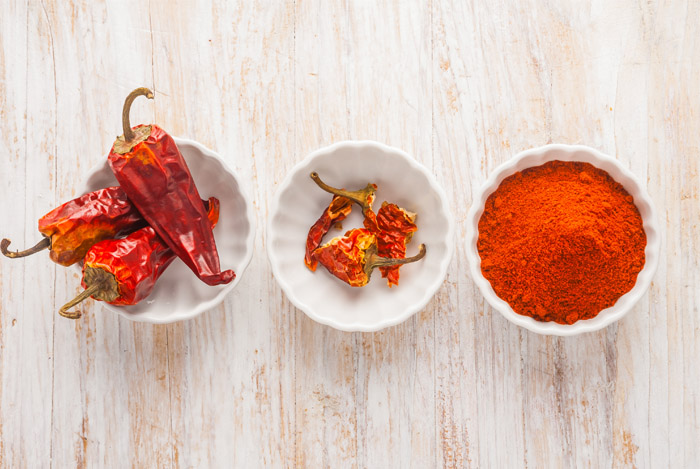 Contrary to the myth I believed for a long time, spicy food and hot peppers actually do more good for our digestive systems than harm.
Contrary to the myth I believed for a long time, spicy food and hot peppers actually do more good for our digestive systems than harm.
Most people shy away from hot foods because they believe they’ll cause ulcers or heartburn.
But according to one Asian study, when people ate food with less capsaicin, they had ulcers three times as much as those who mostly ate spicier Malay or Indian food.
The truth of the matter is that “bacteria called H. pylori cause most ulcers, and capsaicin from hot peppers may help to kill those bacteria”.
Scientists also believe that hot chili peppers may protect the lining of our stomachs. With a strong lining, we’ll be able to block gastric damage caused by medications, harmful chemical additives in our food, and illness.
Plus, hot chili’s decrease the amount of gastric acid and reduce stomach bleeding from NSAIDs like aspirin.
How to Add More Spice to Your Food
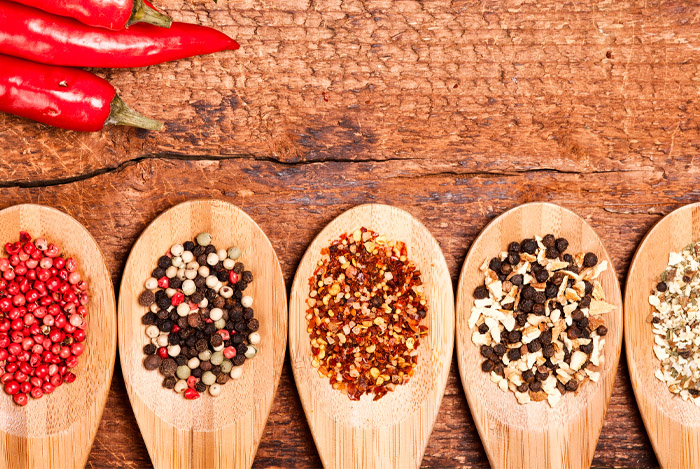 If you’re up for the challenge of adding peppers and chilli’s to your weekly menus, by all means, go right ahead. But for others, adding spices may present a bit of a challenge.
If you’re up for the challenge of adding peppers and chilli’s to your weekly menus, by all means, go right ahead. But for others, adding spices may present a bit of a challenge.
Start off slow, like by making my amazing fat melting drink recipe with fresh ginger. Or try the homemade Thai red chili sauce from my low carb recipes post.
Have a spicy night once a week and try some heat-packing foods from Thai, Indian, or Latin American cuisines. You may find a healthy favorite you stick with regularly.
Keep in mind: less is definitely more when it comes to cayenne and chili powder, but they make fantastic additions to hearty vegetarian chili’s and vegan burgers. You can even sprinkle a bit in your whey protein smoothie for a metabolic kick!
Final Thoughts
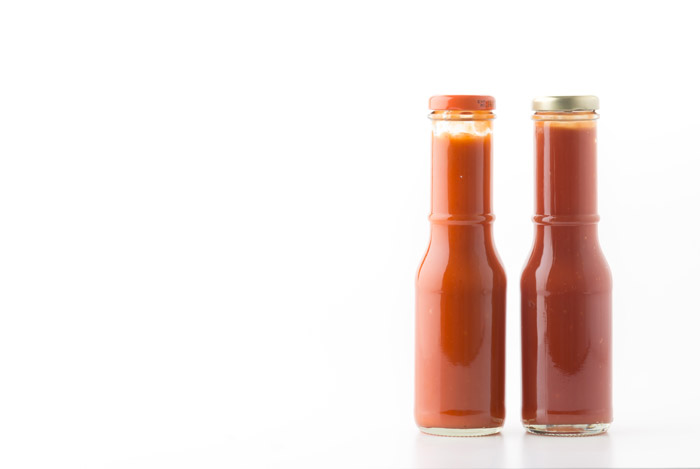 I think the biggest takeaway from our post today is: don’t be afraid of spicy foods.
I think the biggest takeaway from our post today is: don’t be afraid of spicy foods.
Yeah, they may make you cry a little bit, but their health benefits are so worth the fight. Just breathe deeply and have plenty of Greek yogurt on hand to cool the flame.
These amazing spices and peppers have protective powers and the ability to rev up your metabolism to aid in your weight loss goals – they’re on fire in my book.
Do you like spicy foods? Tell me about the hottest food you’ve ever tried! I’d love to hear how you handled it.
The post Why Spicy Food is So Good For You appeared first on Nutrition Secrets.
http://www.nutritionsecrets.com/why-spicy-food-good-for-you/
No comments:
Post a Comment